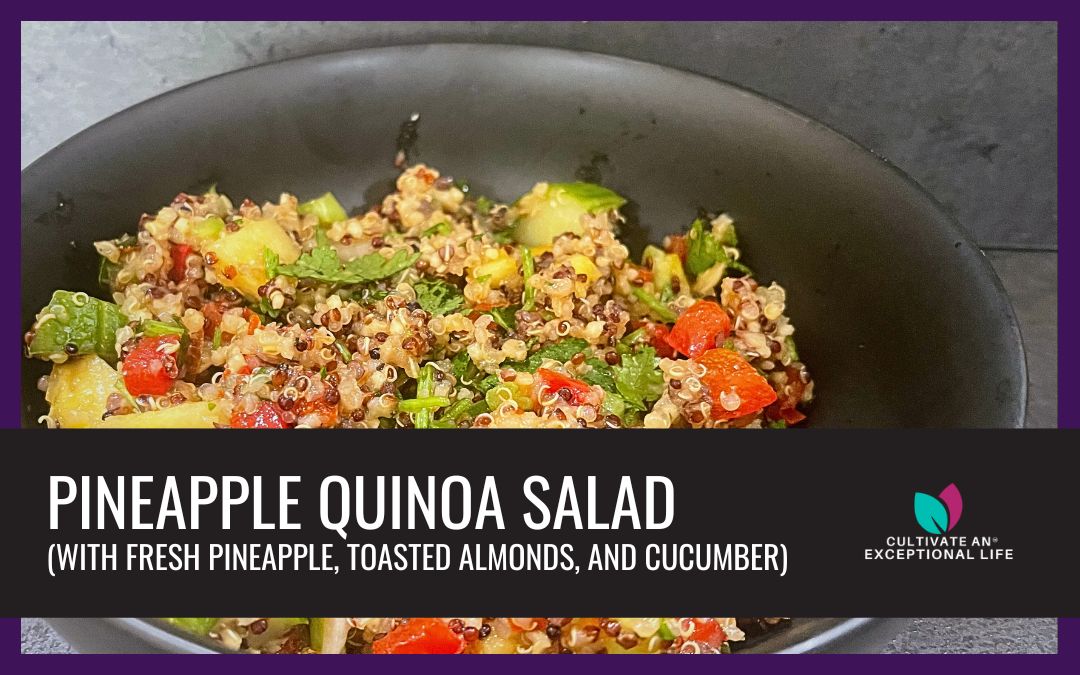This Pineapple Quinoa Salad is more than just a recipe; it’s a celebration of fresh and wholesome ingredients and the perfect fusion of flavors and nutrients. Whether you’re looking for a delicious side dish, a light meal, or a vibrant addition to your menu, this salad has got you covered. Let’s dive into the recipe and discover how to create a dish that’s as pleasing to your palate as it is nourishing for your body.
INGREDIENTS
Let’s take a closer look at the health benefits of each of the ingredients used in this recipe.

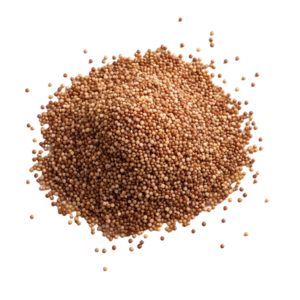
Quinoa
First and foremost, quinoa is a staple ingredient in this salad. This versatile grain is a complete protein source, meaning it contains all nine essential amino acids that our body cannot produce on its own. Quinoa is also high in fiber, which can help keep us feeling full and satisfied for longer periods. Additionally, it is a good source of several essential minerals, including iron, magnesium, and phosphorus. These minerals play important roles in maintaining healthy bones, muscles, and overall body functions.
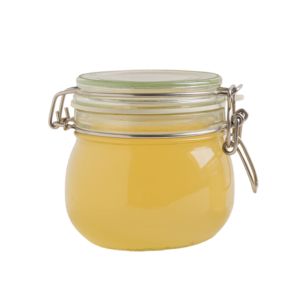
Vegetable Broth
Let’s dive into the remarkable health benefits of incorporating vegetable broth into your Pineapple Quinoa Salad. This is more than just a flavor enhancer; it’s a game-changer for your well-being.
You might think of vegetable broth as a culinary secret, but it’s also a health powerhouse. Unlike using plain water, which is rather lackluster in the nutrient department, vegetable broth is a superhero in disguise.
Here’s the deal: creating vegetable broth involves simmering a medley of vegetables, herbs, and spices in water. This process extracts not only robust flavors but also a cornucopia of essential nutrients. When you use this liquid gold to cook your quinoa, the benefits are twofold.
First, the depth and complexity of flavor it infuses into your salad make each bite a delightful experience. It elevates your dish from ordinary to extraordinary, making it more savory and satisfying, and encourages you to savor every mouthful.
Second, and equally crucial, vegetable broth is a nutrient-rich elixir. The vegetables and herbs that steep in that pot impart a wealth of vitamins and minerals, which get absorbed by the quinoa during cooking. Your Pineapple Quinoa Salad transforms into a nutritional powerhouse, providing you with a wide range of essential nutrients that can support your overall health.
So, when you make the choice to use vegetable broth, you’re not just creating a delicious salad; you’re investing in your well-being. It’s a simple but impactful way to add more flavor and nutrition to your meals.

Fresh Pineapple
Now, let’s chat about what’s happening with that fresh pineapple in your salad. It’s not just about that sweet, tropical zing – it’s like a little health treasure trove hiding in your bowl.
See, pineapple is more than just a delicious fruit; it’s like a natural dose of sunshine for your body. It’s packing a bunch of good stuff that your body will thank you for.
First off, there’s a hearty dose of vitamin C in there. You know, that superhero antioxidant that swoops in to protect your cells from all kinds of mischief. It’s like a shield against damage and a serious boost for your immune system. So, the next time you’re savoring a juicy pineapple chunk, know that you’re giving your body some extra armor to fight off the bad stuff.
But wait, there’s more! Pineapple is also rocking the house with manganese. This mineral is the secret sauce for keeping your bones strong and healthy, and it’s got your back when it comes to healing those cuts and scrapes. You might not think about it often, but your body sure does appreciate the support.
So, when you’re enjoying that Pineapple Quinoa Salad, it’s not just a burst of sweetness; it’s a delightful way to nurture your body with vitamin C and manganese. It’s like a tasty health booster, all in one delightful bite. So, keep on savoring, and know that you’re doing your body a favor while you’re at it!
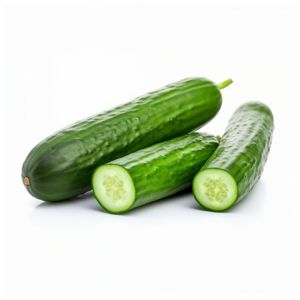
Cucumber
Now, let’s talk about cucumbers – those cool, refreshing slices in your salad. They’re like the hydrating heroes of the vegetable world!
First things first, cucumbers are as light as a feather when it comes to calories. So, if you’re looking to keep things on the healthier side, these guys are your wingmen. They’re like the guilt-free snack you can munch on all day long.
But the real magic happens in that high water content they bring to the table. They’re basically water in veggie form, and that means they’re like a built-in hydration boost for your body. So, if you’ve ever felt like you’re not drinking enough water, just know that munching on cucumbers is a sneaky way to help your body stay refreshed.
Now, here’s something cool – cucumbers come packing vitamin K. This vitamin is like your body’s secret agent for blood clotting. It’s not always in the spotlight, but when you get a cut or a scrape, it’s vitamin K that’s working behind the scenes to keep things under control.
And if that’s not enough, cucumbers also bring some awesome antioxidants to the party. These little compounds are like bodyguards against inflammation. They help keep your body’s “peace” and prevent the kind of inflammation that can cause trouble down the road.
So, when you’re tossing cucumbers into your salad, you’re not just adding crunch and freshness; you’re giving your body a hydrating, vitamin-packed, inflammation-fighting treat. They’re like the unsung heroes of healthy eating!

Red Bell Pepper
Let’s have a little chat about those vibrant red bell peppers you’ve got in your salad. They’re more than just pretty; they’re like nature’s multivitamin!
First up, we’ve got vitamin C. These peppers are like little C-bombs, and that’s fantastic news for your skin and your immune system. You see, vitamin C is like the best friend your skin never knew it needed. It helps keep your skin looking fresh and radiant, and it’s a super antioxidant that fights off the bad stuff that tries to mess with your immune system. So, while you’re munching on those peppers, your skin is saying “thank you!”
But the goodness doesn’t stop there. Red bell peppers also bring vitamin A to the party. This vitamin is like the defender of your vision, your skin, and your immune system. It’s all about maintaining healthy skin, boosting your eyesight, and helping your body stand strong against those pesky germs.
And then, there’s potassium, a mineral that’s like the unsung hero of heart health. It helps regulate your blood pressure and keeps your ticker ticking smoothly. So, when you toss red bell peppers into your salad, you’re not just adding a pop of color; you’re adding a dose of skin-loving, immune-boosting, heart-helping goodness. They’re like nature’s little powerhouses, all wrapped up in that delicious crunch!Write this in a more conversational tone and expand on it:
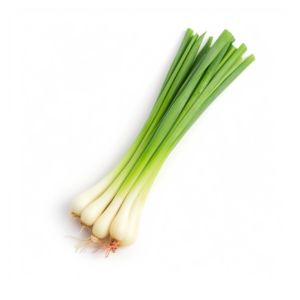
Green Onion
Let’s give a warm welcome to the vibrant green onion, which adds a burst of freshness and a subtle kick of flavor to our Pineapple Quinoa Salad.
Green onions, with their slender stalks and bright green tops, are like nature’s garnish, elevating the visual appeal of your dish. But they do much more than that; they offer a mild oniony flavor that’s crisp and clean, creating a perfect balance with the other ingredients.
These little green wonders aren’t just about adding a dash of flavor; they also bring a sprinkle of nutrients to the party. They’re a good source of vitamins, particularly vitamin K and vitamin C. Vitamin K plays a crucial role in blood clotting and bone health, while vitamin C is the antioxidant that your body loves for its immune-boosting powers.
But it’s not just about the vitamins; green onions are packed with fiber, too. Fiber is like the unsung hero of digestion, helping keep things running smoothly and making you feel satisfied.
So, as you sprinkle those green onion slices on your Pineapple Quinoa Salad, you’re not just adding a pop of color and freshness; you’re infusing your dish with a subtle, crisp flavor and a wealth of nutrients. It’s like the finishing touch that makes your salad shine inside and out!
So, as you drizzle this golden goodness into your Pineapple Quinoa Salad, you’re not just elevating the flavor; you’re also adding a touch of nature’s own remedy. It’s a little touch of sweetness and well-being, all in one delectable ingredient
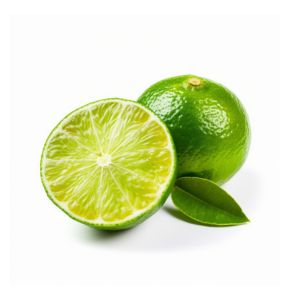
Lime
And let’s not forget the zesty! It is one of my favorite flavors. Lime provides a burst of tangy freshness.
Lime doesn’t just bring a bright, citrusy kick to your dish; it’s like a flavor enhancer that elevates every ingredient it touches. Its acidity balances the sweetness of pineapple, the richness of olive oil, and the earthy tones of quinoa, creating a symphony of flavors that dance on your taste buds.
But lime is not just about flavor; it’s a nutritional powerhouse too. It’s loaded with vitamin C, just like our pineapple, providing an extra boost to your immune system and helping your body absorb iron more efficiently. This little green gem is also known for its antioxidant properties, which can help combat oxidative stress and inflammation in your body.
So, as you squeeze that fresh lime over your Pineapple Quinoa Salad, you’re not just adding a burst of citrusy excitement; you’re infusing your dish with an extra dose of vitamin C and antioxidant goodness. Lime is like the zesty magician that makes your flavors come alive and adds a punch of nutrition to your meal. Enjoy every zingy bite!
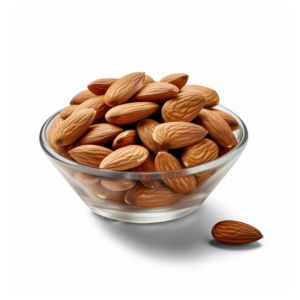
Toasted Almonds
Almonds are like a nutritional powerhouse. They’re full of healthy monounsaturated fats, which are like the “good fats.” These are the fats that can actually be your buddies. They’re heart-healthy and can help reduce inflammation, making your body feel all zen and balanced.
But it doesn’t stop there. Almonds are also packing some fiber, which is like a superhero for your digestion. It keeps things moving smoothly and can make you feel full and satisfied, which is a win-win for your tummy and your waistline.
And guess what? There’s protein in those almonds too. That’s like your body’s building blocks. It helps you recover, stay strong, and is a secret weapon in weight management. You eat some almonds, and they’re like, “Hey, body, I got your back.”
So, when you sprinkle toasted almonds on your salad, you’re not just getting that awesome crunch; you’re adding a dash of healthy fats, a pinch of digestion-loving fiber, and a sprinkle of protein power. It’s like a tasty way to give your body some extra love!
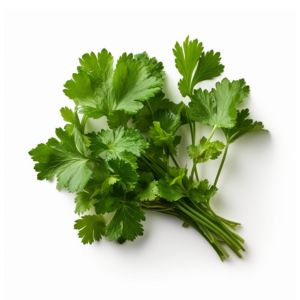
Cilantro
Cilantro isn’t just about adding a pop of green to your dish; it’s all about the punch of unique, citrusy goodness it brings. Its bright, herbaceous notes cut through the sweetness of the pineapple and the crunch of the almonds, creating a beautifully balanced medley of flavors.
But it’s not just about the taste – cilantro also comes with some fantastic health benefits. It’s rich in antioxidants and essential oils that can help reduce inflammation in your body. So while you’re savoring every bite of this salad, you’re also giving your body a little extra love in the form of some natural healing power.
If you are one of those people who think cilantro tastes like soap, you can substitute it with fresh parsley.
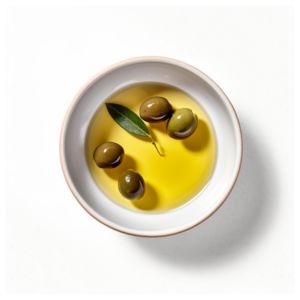
Olive Oil
Let’s talk about the versatile and wholesome olive oil, the unsung hero in our Pineapple Quinoa Salad recipe.
Olive oil isn’t just an ordinary cooking oil; it’s like liquid gold for your culinary creations. It’s responsible for adding a velvety richness to your salad, complementing the flavors of all the other ingredients. Whether used for dressing or sautéing, olive oil has a knack for enhancing the overall taste and mouthfeel of your dish.
But what makes olive oil truly special is its incredible health benefits. It’s like the elixir of the Mediterranean diet, long celebrated for its heart-healthy properties. Olive oil is a good source of monounsaturated fats, the kind that’s known to boost “good” HDL cholesterol and lower “bad” LDL cholesterol, which can contribute to a healthier heart.
Moreover, olive oil is packed with antioxidants, particularly vitamin E, which can help combat oxidative stress in your body. This can lead to improved overall health and even reduced risk of chronic diseases.
Not only is olive oil a flavor enhancer, but it’s also a health ally. So, when you drizzle it over your Pineapple Quinoa Salad, you’re not just adding a touch of richness; you’re infusing your dish with a dose of Mediterranean magic that’s known to be good for your heart and overall well-being. It’s the culinary wizard that keeps both your taste buds and your health in mind!

Honey
Now, let’s talk about the luscious honey in this recipe, which adds a touch of natural sweetness and a delightful, aromatic complexity to our Pineapple Quinoa Salad.
Honey is like a golden nectar from the bees, and it’s more than just a sweet treat. It’s a natural sweetener that brings a gentle, mellow flavor that perfectly complements the tanginess of the pineapple and the freshness of the other ingredients. It’s the bridge that ties all these diverse flavors together, creating a harmonious balance in each bite.
But honey is more than just a taste enhancer; it’s got some health benefits up its sleeve too. It’s known for its natural antibacterial and anti-inflammatory properties, making it a soothing elixir for your body. It can help ease a sore throat, calm a cough, and even offer some allergy relief.
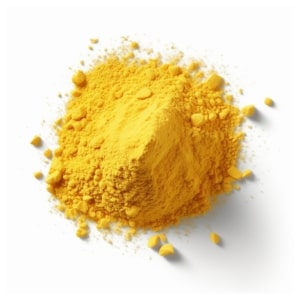
Pineapple Powder
The powdered pineapple will give the dressing even more of a sweet and tropical flavor that complements the fresh pineapple in the salad, but my real motivation for adding it to the dressing is to add more nutrition. If you don’t have any you can leave it out.
Serving Suggestions
Here are some ideas for how to serve your pineapple quinoa salad:
- Just the Way it Is: Serve for lunch, dinner, or a healthy snack.
- As a Side Dish: Serve the salad as a side dish alongside grilled chicken, fish, or other protein sources for a well-balanced meal.
- Topped with Protein: Add a protein source on top of the salad, such as grilled shrimp, tofu, or sliced grilled chicken, to make it a complete and filling meal.
- In Lettuce Wraps: Use large lettuce leaves, such as butter lettuce or Romaine, to make wraps or lettuce cups with the pineapple quinoa salad as the filling.
- In a Tortilla: Fill a tortilla or wrap with the salad and protein of your choice, creating a delicious wrap or burrito.
- Stuffed Peppers or Tomatoes: Use the salad as a filling for bell peppers or tomatoes, then bake them for a warm and savory variation.
- On a Bed of Greens: Serve the pineapple quinoa salad on a bed of mixed greens, such as arugula, spinach, or spring mix, to add more freshness and color.
- In a Bowl: Create a “bowl” with the salad by placing it on a base of quinoa, brown rice, or greens, and add other toppings like avocado, nuts, or cheese.
- Topped with Avocado: Sliced or diced avocado can be a delicious and creamy addition to your pineapple quinoa salad.
- With Bread or Pita: Serve the salad with slices of crusty bread or warm pita to make it a more substantial meal.
- Topped with Fresh Herbs: Garnish with fresh cilantro, mint, or basil to add a burst of flavor and freshness.
- With Sliced Radishes: Sliced radishes can add a peppery kick and a vibrant crunch to your salad.
- Garnished with Crushed Nuts or Seeds: Sprinkle crushed almonds, sunflower seeds, or sesame seeds on top for added texture and flavor.
- Drizzled with Extra Dressing: Serve extra dressing on the side for those who prefer their salads with a bit more dressing.
- On the Grill: Grill some of the salad ingredients, such as the pineapple or red peppers, to add smoky flavors and warmth.
- With a Side of Salsa: Accompany the salad with a side of fresh fruit salsa, like a pineapple or mango salsa, for a fruity and zesty twist.
Pineapple Quinoa Salad With Fresh pineapple, Toasted almonds, and Cucumber

- 3 cups quinoa, rinsed and drained
- 2 cups vegetable broth
- 1/2 pineapple, fresh (peeled, cored, and diced)
- 1 red pepper (diced)
- 2 green onions (thinly sliced)
- 1/2 cup cucumber (chopped)
- 1 bunch cilantro, fresh (chopped)
- 1/4 cup extra-virgin olive oil
- 2 TBSP Cilantro, fresh (chopped)
- 1 TBSP Honey
- 1/2 cup almonds (toasted, and roughly chopped)
- ground black pepper (to taste)
- salt (to taste)
- In a medium saucepan, bring the vegetable broth to a boil over high heat.
- Add the quinoa and stir to combine.
- Reduce the heat to low, cover, and simmer until the quinoa is tender and the liquid is absorbed, about 15-20 minutes.
- Fluff the quinoa with a fork and let it cool to room temperature.
- In a large bowl, combine the cooled quinoa, diced fresh pineapple, diced red bell pepper, thinly sliced green onions, chopped cucumber, and chopped cilantro.
- In a small bowl, whisk together the olive oil, pineapple powder, lime juice, honey, salt, and pepper until well combined.
- Pour the dressing over the quinoa mixture and toss to combine.
- Add the toasted almonds and toss again.
Serve the Pineapple Quinoa Salad chilled or at room temperature. Enjoy!
Can I substitute any ingredients if I don't have them on hand?
Quinoa:
- Barley: Pearl barley or hulled barley can be used as a substitute for quinoa. Barley has a nutty flavor and a chewy texture.
- Brown rice: Brown rice can be used as a substitute for quinoa.
Cilantro
- Flat-Leaf Parsley: Flat-leaf parsley has a fresh, mild flavor and a similar appearance to cilantro. It’s a good substitute if you want a milder herb.
- Basil: Basil has a slightly sweet and peppery flavor. It works well in salads and can provide a different but complementary taste.
- Mint: Mint offers a refreshing, slightly sweet flavor that can add a unique twist to your salad. It pairs especially well with tropical flavors like pineapple.
- Chives: Chives have a mild onion flavor and can be a suitable substitute if you like a hint of oniony flavor in your salad.
- Tarragon: Tarragon has a distinctive anise-like flavor that can add a subtle hint of licorice to your salad.
- Dill: Dill has a fresh, grassy flavor that complements many salads. It pairs nicely with cucumber and citrus elements.
- Arugula: If you’re open to a peppery, slightly bitter green, arugula can add a unique and bold flavor to your salad.
Olive Oil
- Avocado Oil: Avocado oil is a healthy and neutral-flavored oil that works well in salads. It provides a mild, slightly buttery taste.
- Grapeseed Oil: Grapeseed oil has a neutral flavor and a high smoke point, making it suitable for salad dressings.
Almonds
- Sunflower Seeds: Sunflower seeds provide a light, nutty flavor and a pleasant crunch. They are a good option for those with nut allergies.
- Pine Nuts: Pine nuts have a mild, sweet, and buttery flavor. They’re commonly used in Mediterranean salads and add a unique taste.
- Your Favorite Nut
Red Pepper
- Green Bell Pepper: Substitute red bell pepper with green bell pepper for a similar crunchy texture but with a slightly different, milder flavor.
- Yellow or Orange Bell Pepper: These have a sweeter flavor compared to green bell peppers but can still provide a colorful and crunchy element in your salad.
- Carrots: Julienne or shred carrots to replace red pepper. They offer a mild sweetness and a satisfying crunch.









